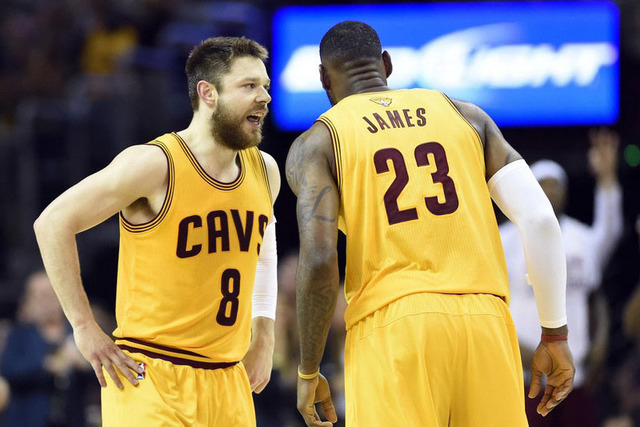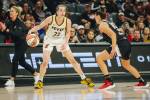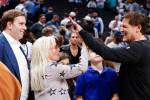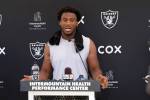Unselfish Aussies all right, mate, on the basketball court
The tall poppy syndrome describes a social phenomenon in which people of authentic excellence are resented, attacked or criticized because their talents elevate them above peers.
It has a different meaning in Australia, not with such a negative and harsh tone, more a measure of the nation’s underdog persona and deep-seated respect for humility.
It’s pretty much why Matthew Dellavedova is the kind of basketball player we have witnessed during the NBA Finals.
June arrived, and we are again seeing why Australia’s best imports in the sport of baskets are so valuable to a team’s overall success, why there isn’t a roster at any level that couldn’t benefit from the presence of one or two players from the world’s sixth-largest country.
They embrace a role of unselfish teammate like nobody’s business.
“They’re playing for something much bigger than themselves,” said Marty Clarke, a giant figure in Australian basketball and assistant coach at Saint Mary’s in the West Coast Conference. “They play out of respect for being given such an opportunity. They play for the guys who came before them.
“What you are seeing in these finals is the Australian culture at work. Do your best. Never complain. Whatever the team needs. It’s the same mindset a guy who sells cars in Australia has. It applies to all walks of life there. Just work as hard as you possibly can at whatever it is you’re doing.”
College basketball has become a virtual smorgasbord of international flavor when it comes to players from distant lands arriving in the United States, and none has done a better job recruiting Australia than the Gaels.
It is a history of success that has produced some fine NBA players.
Patty Mills was a Saint Mary’s product who won a title last year with the San Antonio Spurs, and Dellavedova has surprisingly emerged as an essential piece for a Cleveland Cavaliers side that is tied 2-2 entering Game 5 today at the Golden State Warriors.
But it doesn’t stop with those who played collegiately in the small Bay Area town of Moraga.
Andrew Bogut is an Australian center for the Warriors opposing Dellavedova’s team. Aron Baynes is a teammate of Mills on the Spurs and a world champion.
Before them came Luc Longley and his three titles with the Chicago Bulls in the 1990s. Before him came Andrew Gaze, for whom the Most Valuable Player award in Australia’s top professional league is named.
There is the future that is Ben Simmons and the present that is Dante Exum and the past that is Mark Bradtke. Clarke has coached most of them, including many others who have made the NBA.
“This is really now the third generation of basketball players coming into the game at the pro level, kids of parents and grandparents who played the game,” he said. “Prior to the 1960s, basketball was a very minor sport in Australia. Maybe some played it just to have another option to cricket and tennis. But then a national league was formed in 1979, and you saw kids really taking the game up in earnest.”
A major difference came a few years later.
Think of Australia this way: Its population is almost 15 million souls fewer than California and yet it’s the largest country without a land border and in the Southern Hemisphere.
It is really, really, really spread out.
So as time passed and the nation’s best youth players hardly ever traveled to compete against each other in one central location, the government in 1981 founded the Australian Institute of Sport, where top athletes would live and train in the capital city of Canberra.
Of the eight sports originally featured, basketball was one.
From there, everything changed. The women’s national team grew into one of the world’s best, having medaled in every Olympics since 1996. The men continued to produce strong college and NBA players, all with the same unselfish traits.
Australian players don’t get rattled much. They tend to stay in the moment as much as they dive for loose balls. Dellavedova was thrust into a starting role in the NBA Finals when All-Star point guard Kyrie Irving fractured his left kneecap in Game 1 and has responded by averaging almost 10 points and three assists. Dellavedova was extremely effective in Games 2 and 3 wins and not so much in a Game 4 loss.
One man who has coached Dellavedova and Bogut won’t expect either to exhibit much change in temperament, no matter how the series plays out.
“We have a saying in Australia that goes, ‘She’ll be all right, mate,’ ” Clarke said. “It means, ‘Don’t panic. It will all be OK.’ We’re pretty laid back about things. We don’t get very worked up. Both of those guys can play hard and yet not get caught up in much drama. Whatever happens happens. You just move onto the next play.
“Basketball is still very much a flavor-of-the-month thing in Australia, still relatively small in stature. I suppose as young kids see what Patty did last year and what Delly is doing now, the interest will increase. The end point for most is first representing Australia in the Olympics and then making the NBA. That’s the dream.”
That, and never allow one’s head to swell above a poppy.
Las Vegas Review-Journal sports columnist Ed Graney can be reached at egraney@reviewjournal.com or 702-383-4618. He can be a heard on “Seat and Ed” on KRLV 1340 from 2 p.m. to 4 p.m. Monday through Friday. Follow him on Twitter: @edgraney.






























